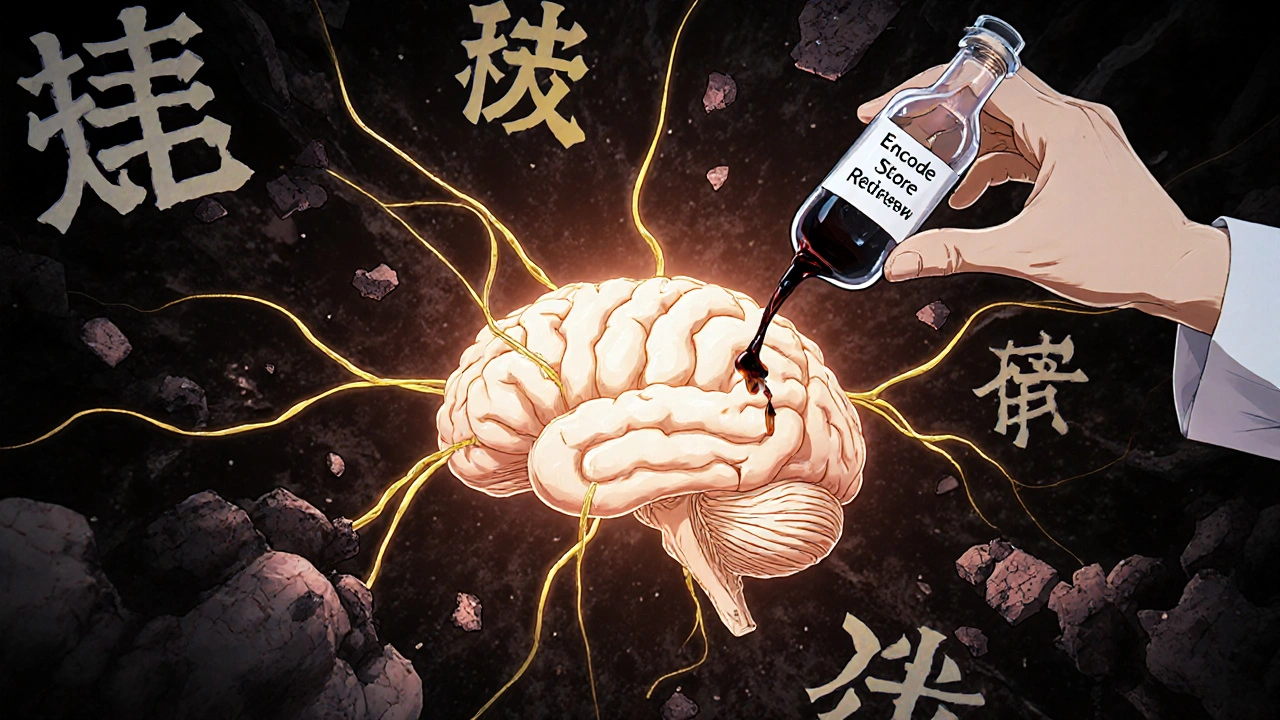Have you ever taken oxcarbazepine and noticed you’re forgetting where you put your keys, struggling to recall names, or feeling mentally foggy? You’re not alone. Thousands of people on this medication for epilepsy or nerve pain report similar issues-but few doctors talk about it openly. The truth is, oxcarbazepine doesn’t just stop seizures. It can also slow down how your brain processes and holds onto information.
What Is Oxcarbazepine, Really?
Oxcarbazepine is an anticonvulsant drug, first approved in the 1990s, used mainly to treat partial seizures in adults and children. It’s also prescribed off-label for trigeminal neuralgia and sometimes bipolar disorder. It works by calming overactive nerve signals in the brain, which helps prevent seizures from spreading. But that same calming effect doesn’t just target seizure pathways-it can affect areas tied to memory, attention, and mental speed.
Unlike older seizure drugs like phenytoin or carbamazepine, oxcarbazepine was designed to be gentler on the liver and cause fewer drug interactions. That’s why so many people switch to it. But here’s the catch: being safer for your liver doesn’t mean it’s safer for your brain. Studies show it can still interfere with how neurons communicate in the hippocampus-the part of your brain that turns short-term memories into long-term ones.
How Oxcarbazepine Slows Down Memory Formation
Memory isn’t one thing. It’s a chain: encoding (taking in info), consolidation (storing it), and retrieval (calling it back). Oxcarbazepine doesn’t erase memories. Instead, it makes it harder for your brain to lock them in.
Research published in Epilepsy & Behavior in 2023 tracked 127 adults on oxcarbazepine for six months. Nearly 60% reported trouble remembering new information-like names, appointments, or where they parked. Brain scans showed reduced activity in the medial temporal lobe during memory tasks. That’s the same area that lights up when you’re trying to recall a friend’s birthday or what you had for breakfast.
Why? Oxcarbazepine blocks sodium channels in nerve cells. That’s good for stopping seizures. But sodium channels are also needed for the rapid electrical signals that help neurons fire together to form memory traces. When those signals get dampened, your brain’s ability to create new connections slows down. Think of it like trying to write with a pen that runs out of ink halfway through each sentence.
Who’s Most at Risk for Memory Issues?
Not everyone on oxcarbazepine struggles with memory. But some groups are far more likely to notice changes:
- People over 65: Aging brains already process slower. Adding a drug that reduces neural firing can push memory function past a tipping point.
- Those on high doses: Above 1,200 mg per day, cognitive side effects jump significantly. Dose matters more than you think.
- People taking multiple seizure meds: Combining oxcarbazepine with lamotrigine or levetiracetam increases the risk of brain fog.
- Those with pre-existing memory concerns: If you’ve had mild cognitive issues before starting the drug, oxcarbazepine can make them worse.
A 2022 study from the University of Melbourne followed 89 older adults on oxcarbazepine. Those who scored below average on memory tests before starting the drug saw a 30% drop in recall ability after three months. The ones who started with strong memory scores? Almost no change.

Is the Memory Loss Permanent?
No. For most people, memory problems fade after stopping the drug-or even after lowering the dose. A 2021 follow-up study in Neurology showed that 82% of patients who reduced their oxcarbazepine dose by 25% reported noticeable improvement in recall within 6 weeks. Those who stopped entirely saw full recovery in 3 to 6 months.
But here’s the catch: if you’ve been on high doses for years, recovery can take longer. And if you’re over 70, your brain may not bounce back as quickly. That doesn’t mean it won’t recover-it just means patience and support are key.
What You Can Do Right Now
If you’re on oxcarbazepine and feel your memory slipping, don’t panic. But don’t ignore it either. Here’s what works:
- Track your symptoms. Keep a simple notebook: note when you forget things, how often, and what kind (names? tasks? conversations?). This helps your doctor see patterns.
- Ask about your blood level. Oxcarbazepine’s effects vary based on how much is in your blood. A simple test can show if you’re above the therapeutic range (30-100 mcg/mL). Levels above 100 increase cognitive risk.
- Try a dose reduction. Talk to your neurologist about lowering your dose by 15-25% for 4-6 weeks. Many people find memory improves without losing seizure control.
- Boost brain health. Sleep, hydration, and regular walking help. A 2024 study found that patients on oxcarbazepine who walked 30 minutes daily saw 20% better memory scores than those who didn’t.
- Check for other causes. Low vitamin B12, thyroid issues, or sleep apnea can mimic drug-related memory loss. Get those tested.

Alternatives to Consider
If memory problems persist and your seizures are well-controlled, you might consider switching. Here’s how some common alternatives compare:
| Medication | Memory Impact | Typical Dose Range | Best For |
|---|---|---|---|
| Oxcarbazepine | Moderate to high | 600-2,400 mg/day | Partial seizures, trigeminal neuralgia |
| Lamotrigine | Low to mild | 50-400 mg/day | Generalized seizures, bipolar disorder |
| Levetiracetam | Mild (can cause brain fog) | 500-3,000 mg/day | Children, focal seizures |
| Zonisamide | Moderate (word-finding trouble) | 100-400 mg/day | Drug-resistant epilepsy |
| Topiramate | High (often causes memory loss) | 25-400 mg/day | Migraine prevention, refractory seizures |
Lamotrigine is often the top alternative for people worried about memory. It’s slower to titrate, but studies show it has the least impact on cognitive function among common seizure drugs. Levetiracetam is another option, though some people report mental sluggishness-just not as consistently as with oxcarbazepine.
When to Talk to Your Doctor
You don’t need to wait until you’re forgetting your grandchild’s name. If you notice any of these signs, schedule a chat:
- Forgetting appointments more than once a month
- Needing to write down everything just to remember
- Feeling mentally slower than you used to
- Friends or family comment that you seem "distant" or "out of it"
Bring your symptom log. Ask for a blood level test. Ask about switching or lowering your dose. Most neurologists will agree: if your seizures are controlled and your memory is suffering, it’s worth exploring changes.
Final Thought: It’s Not Just About Stopping Seizures
Oxcarbazepine saves lives. For many, it’s the only thing keeping seizures at bay. But quality of life matters too. Living without seizures means nothing if you’re constantly forgetting why you walked into a room.
The goal isn’t just to stop convulsions. It’s to help you live fully-remembering birthdays, holding conversations, learning new things. If your medication is stealing pieces of your day-to-day life, it’s time to ask: is there another way?
Does oxcarbazepine cause permanent memory loss?
No, oxcarbazepine does not cause permanent memory loss in most people. Memory problems usually improve after lowering the dose or stopping the medication. Recovery can take weeks to months, especially in older adults or those on high doses for years. Brain function typically returns to baseline once the drug is cleared from the system.
Can I take memory supplements with oxcarbazepine?
Some supplements like omega-3s, vitamin B12, and phosphatidylserine may support brain health without interfering with oxcarbazepine. But avoid high-dose ginkgo biloba or St. John’s wort-they can affect how your liver processes the drug. Always check with your doctor before starting anything new.
Is oxcarbazepine worse for memory than carbamazepine?
Studies show oxcarbazepine causes fewer side effects overall, but when it comes to memory, the difference is small. Both drugs affect sodium channels similarly, and both can impair recall. Some people tolerate oxcarbazepine better, but memory issues occur with both at similar rates, especially at higher doses.
Can I stop oxcarbazepine if my memory is bad?
Never stop oxcarbazepine suddenly. Doing so can trigger seizures or status epilepticus. Always work with your neurologist to taper off slowly-usually over weeks or months. Your doctor may switch you to another medication or lower your dose gradually to protect both your brain and your safety.
At what dose do memory problems start?
Memory issues can appear at doses as low as 600 mg/day, but they become more common above 1,200 mg/day. Blood levels above 100 mcg/mL are strongly linked to cognitive side effects. If you’re on a high dose and notice brain fog, ask for a blood test-it might be easier to fix than you think.
Does oxcarbazepine affect long-term memory or just short-term?
It mainly affects short-term memory and encoding-the ability to form new memories. Long-term memories formed before starting the drug usually stay intact. But if you’re constantly struggling to store new info, it can feel like your long-term memory is failing. That’s because you’re not adding new things to it.





Iván Maceda
November 2, 2025 AT 10:05Vrinda Bali
November 4, 2025 AT 05:47Sara Allen
November 4, 2025 AT 14:32Amina Kmiha
November 6, 2025 AT 12:23Ryan Tanner
November 7, 2025 AT 11:23Jessica Adelle
November 9, 2025 AT 04:38Jonathan Debo
November 9, 2025 AT 11:13Robin Annison
November 10, 2025 AT 00:02